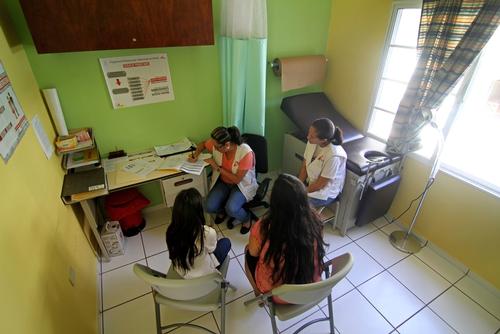In Honduras, Médecins Sans Frontières is helping young survivors of sexual violence rebuild their lives.
Honduras is considered one of the most dangerous countries in the world. Yet, the medical consequences of violence are overlooked as a public health emergency. Since 2011 Médecins Sans Frontières (MSF) has been providing medical and psychological care, and social support, to victims of violence, including sexual violence, in the capital of Tegucigalpa. In 2014, 57 per cent of MSF’s patients were under 18 years of age.
MSF’s Servicio Prioritario or ‘priority service’ responds to patients’ needs in a single place – a sensitive alternative to the norm of fragmented services in multiple locations. This one-stop package is available in two of the capital’s health centres and the main public hospital. Diana Castillo, a medical doctor, is part of the team providing this daily service.
"An aggression is not something you can forget,” says Diana. “It is terrible to see a patient—a 12 year-old girl—who has been abused by five or six men, pregnant. It is really difficult for these patients. They may abandon their babies at birth because there is a rejection effect, which is understandable. They are teenagers, many of which will never be able to overcome what happened to them. Some also revert to clandestine abortions, and some die from it. I've had patients telling me ‘Doctor, if you don’t give me something, I will go somewhere else to get an abortion’”.
Sexual assault and its mental health consequences can have a considerable impact on the life of a survivor, who may be ostracised by family, their partner, in school or at work. To reduce their suffering, treatment by MSF includes the use of therapeutic tools enabling a survivor to express her emotions, preoccupations and fears. As part of this therapy one adolescent wrote in a note to her assailant: “I wanted to become a lady, I wanted to get married, [but] all my dreams have been thrown in the trash.”
Karen Dominguez, a social worker within the MSF team, explains how lives can be upheaved following sexual assault. “I remember a girl, a college student, who had to abandon her studies. She told me: ‘I don’t want to leave my studies, I'm in my second year, I want to graduate’. We had to send her to a shelter house and she then had to move [away] with members of her family. She told me: ‘What am I going to do now with this baby, it means now that I have to work’. Many teenagers have to assume the role of a mother, of a single mother, sometimes without the emotional support of their family. And when the baby grows, they have to cover all their needs, they have to look for a job, quit school and take on a responsibility that they did not expect to have so young.”
MSF continues to advocate and communicate on the medical and mental health consequences of getting pregnant as a girl or young woman, and to push for sexual violence services to be rolled out to the rest of the country under a national protocol on treatment of victims of sexual violence. The organisation has also highlighted the need for the emergency contraceptive pill (ECP) to be legalised in Honduras, to enable survivors to avoid an unwanted pregnancy or unsafe abortion. A debate initiated in the Honduran Congress to change policy on ECP continues today.
Since 2011, Médecins Sans Frontières has offered emergency medical and psychological support to victims of sexual violence in Tegucigalpa, Honduras. In 2014, Médecins Sans Frontières treated 779 victims of violence including 527 victims of sexual violence, and carried out 1,654 mental health consultations.



